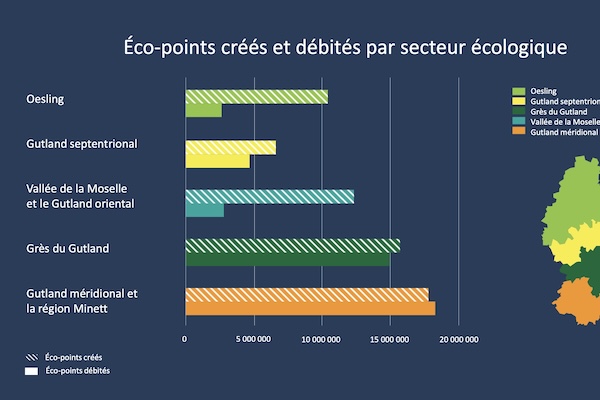 Eco-points created and debited by Luxembourg’s ecological sector.;
Credit: MECB
Eco-points created and debited by Luxembourg’s ecological sector.;
Credit: MECB
On Friday 25 April 2025, Luxembourg’s Minister of the Environment, Climate and Biodiversity, Serge Wilmes, presented a national review of the eco-points assessment and compensation system, as well as of the national compensatory pool.
Ecological compensation is one of the principles framed by a 2018 law, aimed at reconciling the protection of nature and biodiversity with the economic and demographic development of the country. It is based on the obligation to repair ecological damage and is thus equivalent to actions to restore or create biotopes or protected habitats.
In a press release, the Ministry of the Environment, Climate and Biodiversity stated that the results of the review were generally positive at national level and the system had demonstrated its effectiveness. However, in Luxembourg’s Minett region, difficulties providing the necessary reserves to guarantee this service were reported. Minister Wilmes therefore announced an extension of the law regarding ecological compensation obligations until 2033.
The principle of eco-points and compensatory pools, as introduced by the aforementioned law, is described as having revolutionised the system of compensatory measures and greatly simplified this procedure, in finding the correct balance between the destruction of biotopes in the context of development projects and their restitution. This system offers the parties concerned - including individuals, developers or public institutions - the opportunity to avoid their obligation to compensate for destroyed biotopes themselves by paying a refund tax. The implementation of biotope restoration measures in compensatory pools and their monitoring are then handled by the Nature and Forest Agency (Administration de la Nature et des Forêts - ANF).
Since the law came into force in 2018, 43 million eco-points have been recorded in the registry and 62.7 million eco-points have been generated in the national areas of the compensatory pool, distributed across the country's five ecological sectors. Although the ANF has succeeded in creating a surplus of eco-points for the entire country, the ecological balance is described as remaining precarious in the two sectors subject to the greatest demographic pressure, or at least, the reserves generated there remain insufficient. Therefore, in order to promote urban and economic development without compromising the quality of compensatory measures, this bill provides for an increase in the period stipulated in Article 82 of the 2018 law to fifteen years, bringing it to 2033.
The ministry stated that to guarantee the availability of eco-points to developers of long-term urbanisation projects, it is also necessary to ensure the sensitive development of new construction zones, taking into account climate adaptation and the "Avoid, Mitigate, Compensate" principle. Furthermore, a joint government effort is needed to make sufficient land available to enable the coherent and consistent deployment of compensatory pools. With this in mind, an interministerial working group of experts has been established to identify avenues and develop solutions, especially for regions with high demographic and economic pressure in the south of the country.
Minister Wilmes underlined: “The national balance of eco-points reflects the great efforts that have been made, as indicated by the compensation measures in the area pool. The new guiding principle in these procedures is that we compensate as close as possible to the intervention in order to preserve nature on site and, by making as many provisions as possible, to increase climate protection and our quality of life. These measures, together with the recent changes to the Nature Conservation Act, contribute to increasing the acceptance of nature conservation. More nature in our cities and villages is essential for a better quality of life”.








